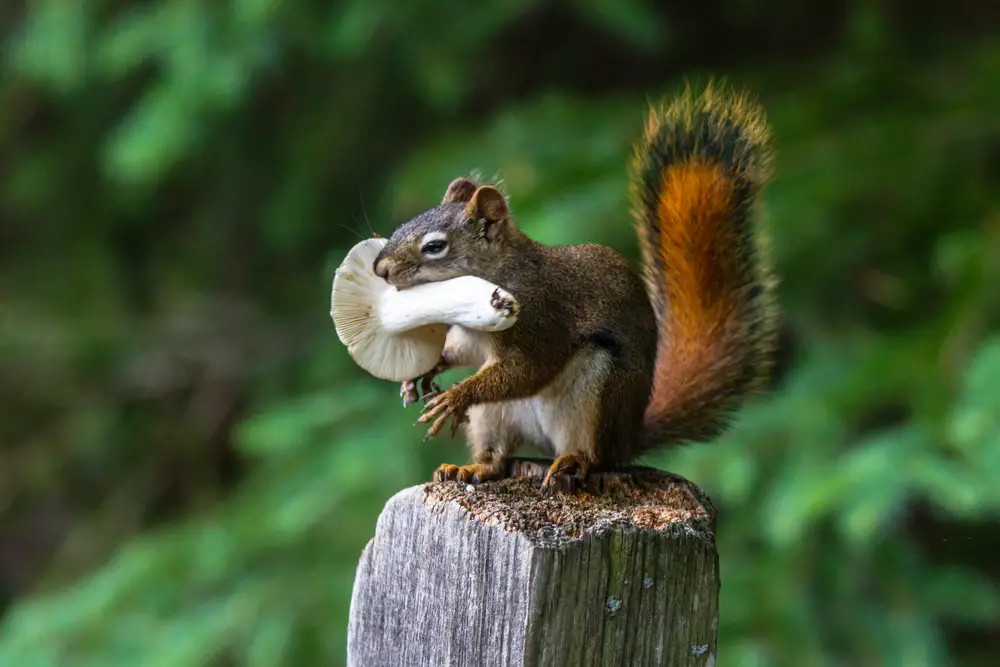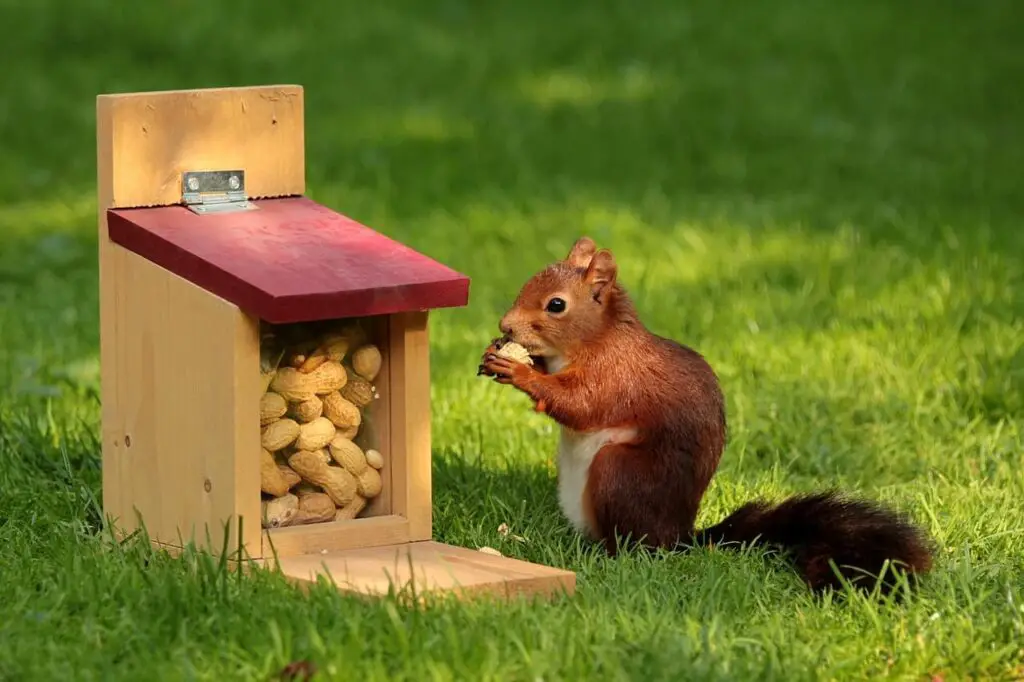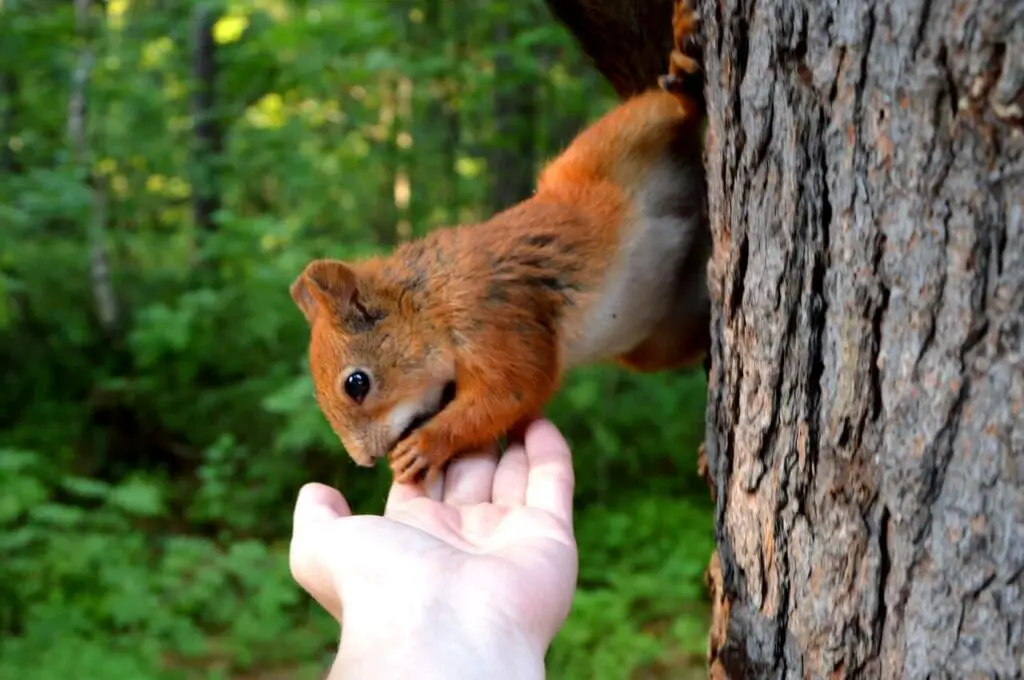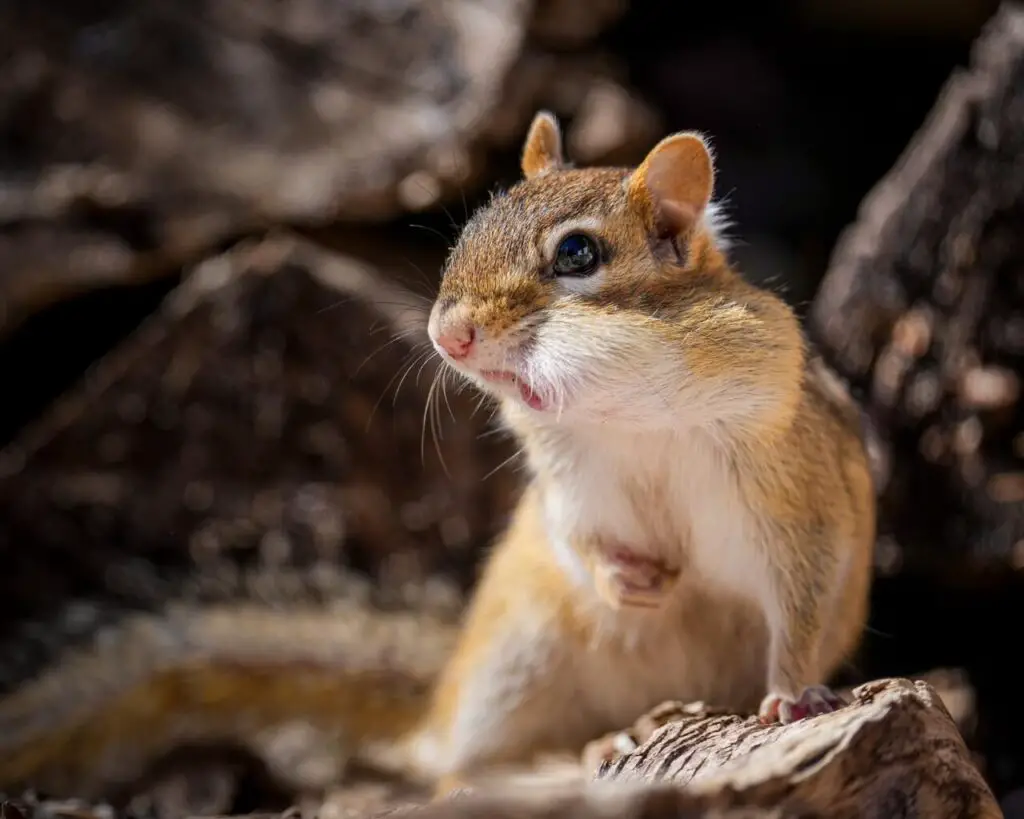Squirrels are fun animals, and seeing them running around in your garden is always a delightful sight. Unfortunately, these little mammals usually steal the food you put out for the birds in your garden, so what do squirrels eat? How can you make sure that they’re thriving in your garden or not stealing the food you’ve set up for another purpose?

In this article, you will learn everything you need to know about the perfect diet for a squirrel. So, keep on reading.
Table of Contents
Squirrels Are Curious
Squirrels are pretty common in North America, and it’s likely that you’ll find the Eastern gray squirrel, red squirrel, or fox squirrel running around in your garden or backyard.
If you’ve set up food for the songbirds that come to visit your backyard or for your chickens, you might be annoyed by their continuous efforts to take what’s not theirs. You might also be wondering about the perfect squirrel’s diet if you’re planning to keep one as a pet.
Luckily, squirrels have a very versatile diet. As a matter of fact, they can eat almost everything they get their little hands on. They’re extremely curious and might try to eat something that they weren’t supposed to be eating.
In the wild, squirrels mainly feed on plants as these excellent foragers eat roots, leaves, nuts, bulbs, bark, fungi, and fruits. But ever since they’ve come to share their living space with humans, they’ve expanded their palates and tried more types of food that they’ve come to like.
It’s not surprising to see a squirrel enjoying the food remnants discarded by people in public parks or children in the school garden. Even the food you set outside for your dog or cat is likely to attract a hungry squirrel.
What Do Squirrels Eat?

Squirrels eat a variety of foods, even the ones that they shouldn’t be eating. However, in this article, we’ll focus on the essential types of food that are meant to keep a squirrel healthy while covering its dietary needs.
Plants
Squirrels like to forage to eat the roots, plant stalks, leaves, and even bark of plants. They will eat anything that can provide them with nutritional value.
They usually prefer tender branches or soft twigs, new growth, young leaves, sprouts, and flower buds because they’re soft and delicious. Squirrels also like to feed on different kinds of seeds that might be available. This includes sunflower seeds, safflower seeds, pumpkin seeds, and poppy seeds.
Because they don’t mind eating any part of the plant, having squirrels in your flower garden is usually a big problem. They will potentially target any new growth in your garden, which will eventually put your flowers and other plants at risk.
Fruits
Thanks to their powerful claws, squirrels are able to climb fruit trees easily and grab the fruits to eat them. If you’re growing fruits in your garden, you’ll probably know that nearby squirrels can be a nuisance since they feed on the harvest of grapes, kiwi, apples, figs, plums, nectarine, peaches, and mangoes.
They also love all kinds of berries, bananas, melons, and cherries. Fruits provide squirrels with the needed sugar that boosts their energy, so they can jump around and forage all day long without getting tired. Moreover, they’re rich in minerals and vitamins that keep the squirrel healthy.
Vegetables
This is bad news for gardeners who grow vegetables in their gardens, as squirrels enjoy eating all kinds of leafy greens. So if you’re growing arugula, spinach, kale, or lettuce, you probably know that keeping squirrels away from them can be really tough.
Squirrels also feed on other veggies like root vegetables, carrots, cabbage, leeks, celery, cauliflower, okra, eggplant, brussels sprouts, squash, corn, peas, and tomatoes. Dealing with hungry squirrels can be a challenging task for anyone trying to grow a variety of veggies in their garden.
Nuts
Acorns are probably every squirrel’s favorite, but when there’s no access to acorns, squirrels will eat all kinds of nuts, including walnuts, pecan, pine nuts, macadamia, almonds, and hazelnuts. As a matter of fact, nuts are the squirrels’ absolutely favorite food and their ultimate source of proteins and fats.
When a squirrel finds a big source of nuts, it will usually take some and save them for later use. By climbing trees and spreading the seeds, squirrels do a great job of guaranteeing the healthy growth and spread of plant life. Moreover, the saved nuts represent a good food source for other animals that might find the squirrel’s hiding place.
However, if you’re growing nuts in your garden, your harvest will definitely be at risk. This is why you should install netting or metal wrap around your nut tree to keep the greedy squirrels from destroying your harvest.
Fungi
While they’re foraging for plant roots and leaves, squirrels don’t mind feeding on fungi that naturally grow in their woodland and forest habitats. Squirrels feed on truffles, oyster mushrooms, and acorn truffles. These fungi can be found hidden under the soil or growing on the bark of trees or around moist areas.
The animals might also choose to store these mushrooms for later use by drying them and keeping them in their hiding place, making sure that other squirrels or animals won’t have access to them.
Birdseed
If you’re an avid birdwatcher and have set up a bird feeder in your garden or backyard, you probably already know that other animals will also find this bird feeder tempting. Squirrels, as well as other rodents in your garden, will probably be interested in eating the birdseed you keep for songbirds and woodpeckers.
Squirrels don’t mind eating grains and seeds like black oil sunflower seeds or even peanut spread that you might keep for birds in winter. Most birds are tolerant of squirrels eating at their feeding stations, but some, like the Northern Cardinal, can become aggressive. So, be sure that you put prevention in place to protect your bird feeders.
Bugs
While they’re not the squirrels’ primary source of protein, in some cases, squirrels can choose to complement their diet with different insects and bugs. This usually happens when other types of food aren’t available, especially in the winter.
Squirrels can find insects and bugs in the bark of trees or hidden in different cavities. They prefer to feed on caterpillars, crickets, larvae, grasshoppers, and different types of injured winged bugs like butterflies and moths.
Eggs
When food is hard to find, squirrels will have to do whatever it takes to stay healthy and alive. This includes stealing the eggs of other animals and birds. Squirrels are known to attack the nests of songbirds and woodpeckers or might even eat the hatchlings and young birds that fall from their nests.
Eggs are rich in proteins and keep the squirrel healthy when nuts aren’t readily available. Since squirrels are clever foragers, birds usually take great measures to make sure that their nests are properly protected. If you have set up a nest box in your backyard for a breeding pair of birds, you want to make sure that the entrance is properly concealed to keep the squirrels and other predators away.
Kitchen Waste
In addition to the natural types of food that squirrels find and feed on in their environment, they’ve learned to like several types of food that are discarded by humans. Squirrels are fond of foraging, so they will explore the remnants of picnic food or kitchen waste that you toss in the garbage or leave in the park at the end of a day.
Naturally, cheese shouldn’t be considered a type of food consumed by squirrels. However, these animals are now sharing spaces with humans who consume cheese in outdoor settings. Since cheese is popular picnic food, squirrels can easily gain access to it. In some cases, humans also give squirrels cheese on purpose, so they’ve come to like its taste.
Squirrels don’t have a specific craving regarding cheese, so they will probably eat whatever you toss their way. This includes Swiss cheese, cheddar, gouda, or any type of cooked cheese. They can eat cheese on its own, in a sandwich leftover, or pizza scraps that you have discarded.
These animals don’t even get sick if the cheese is slightly old, as their stomachs are designed to resist the mold and fungi that would otherwise make humans sick. This is why it’s quite common to see squirrels feeding at a residential compost.
Cheese leftovers can provide squirrels with the needed energy as it’s rich in proteins and fats. This will help the squirrel stay healthy, especially during the cold winter months.
While they’re not primarily meant for squirrels, cereals are extremely attractive to these small mammals because they’re made of grains and probably contain some nuts. Even if the cereals have a special fruit flavor, squirrels would still love them.
These cereals are loaded with sugar, so they give the squirrel an energy boost. Nevertheless, they’re not originally made to be consumed by these animals, so artificial colors and preservatives can have a harmful effect on squirrels’ health.
Squirrels don’t mind eating other types of food like bread and crackers. They will eat cooked veggies and discarded fruits or any other type of kitchen waste. They also like to feed on dog and cat food that you set up for your pets or discard when not eaten.
What Are the Kinds of Food that Squirrels Won’t Eat?

Although squirrels are opportunistic, they will definitely say no to some types of food even if they’re extremely hungry. Squirrels don’t like all types of spicy or hot food, so they will avoid any kitchen waste that contains spicy sauce or hot peppers. As a matter of fact, this is one of the tricks that gardeners use to protect their harvest by spraying pepper spray that turns squirrels off.
Squirrels also hate raw onion and raw garlic, so they won’t eat them if you’re growing them in your garden. You can also use garlic spray to keep squirrels away from your vegetables and flowers.
Although they eat flower bulbs, there are several types that they avoid, like daffodils and snowdrops. Growing them in your garden means that squirrels won’t be happy about visiting your garden on a regular basis.
There are other types of food that squirrels will eat, like desserts and food that’s loaded with preservatives. These types of food can make squirrels sick, so you need to avoid leaving them in the garden to protect these cute little animals.
